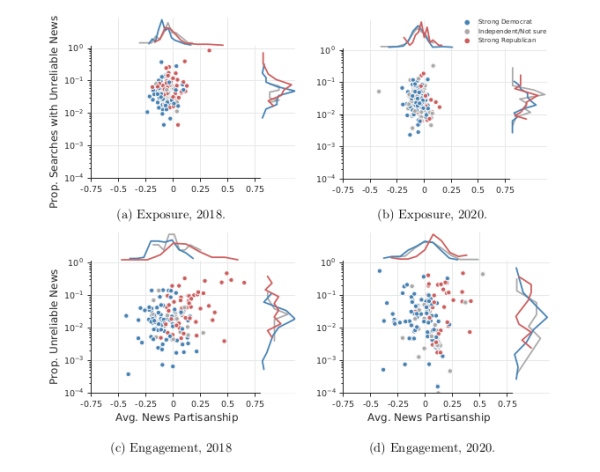Filter bubbles are out, echo chambers are in
But in practice, they all continue to suck.
A recent study shows that “Engagement Outweighs Exposure to Partisan and Unreliable News within Google Search”. In plain English, that would mean that the research “highlights the importance of users”' choices [when evaluating the overall] impact of online search and social media platforms" The main findings were:
- “small but significant differences in exposure to partisan news on Google Search”
- “significant differences in the amount of partisan news participants' engaged with”

This indicates “a weak filter bubble effect in the news our participants saw in their Google Search results, and a substantially stronger echo chamber effect in the domains our participants engaged with while browsing the web”.
Or, as observed by G. Tesio on the Nexa mailing list: “engagement (that is, choice by users, not algorithms) with partisan contents is greater than exposure decided by Google search algorithms to the same partisan contents”
As I read it, that study strenghtens the thesis that, in the age of made-to-polarize social media:
- yes, individual, more or less conscious choices or prejudices make us see only what they wish to see instead of the complete reality, more than what algorithms decide to show us when we explicitly ask them to do it (i.e. when searching something via Google)
- this makes no big practical difference with social media made to order to only and always show what one likes to see, in order to keep everybody hooked. No matter how you put it, the arrival of social media that are eco chambers made things worse…
- even more so when considering that, thanks to the same social media and many other pre-existing reasons, a crucial difference between extremist clickbait and quality journalism is that, unlike the latter, clickbait is never paywalled
Who writes this, why, and how to help
I am Marco Fioretti, tech writer and aspiring polymath doing human-digital research and popularization.
I do it because YOUR civil rights and the quality of YOUR life depend every year more on how software is used AROUND you.
To this end, I have already shared more than a million words on this blog, without any paywall or user tracking, and am sharing the next million through a newsletter, also without any paywall.
The more direct support I get, the more I can continue to inform for free parents, teachers, decision makers, and everybody else who should know more stuff like this. You can support me with paid subscriptions to my newsletter, donations via PayPal (mfioretti@nexaima.net) or LiberaPay, or in any of the other ways listed here.THANKS for your support!